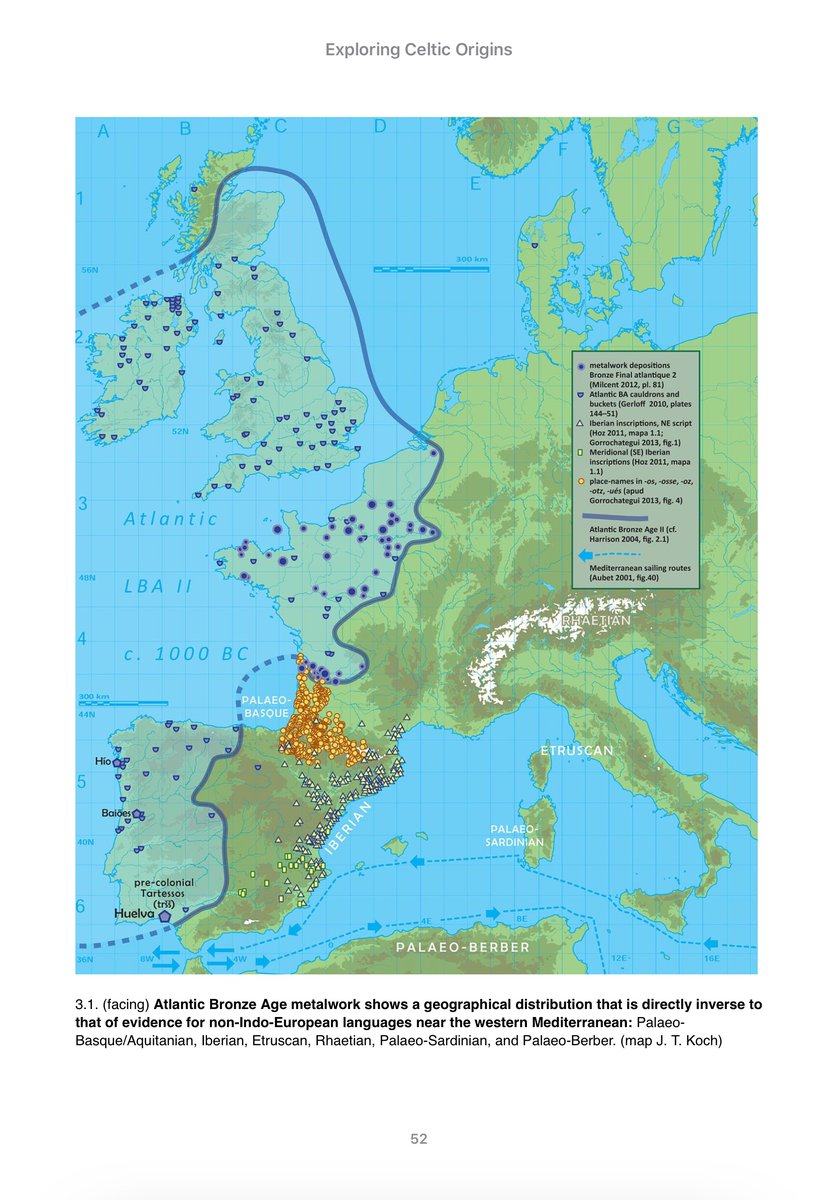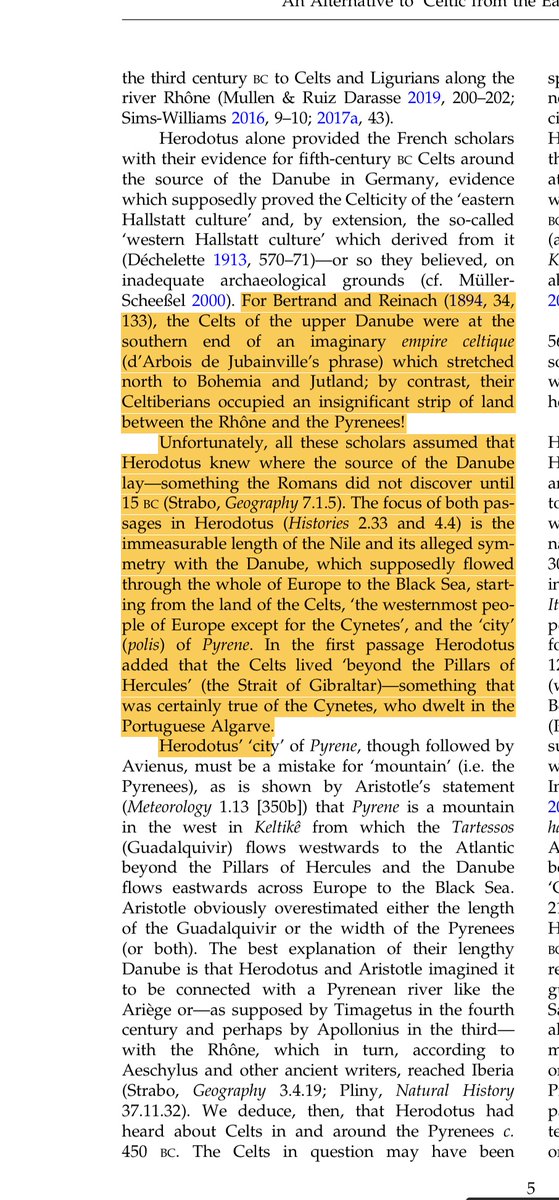Example of the debates of Tartessian, Celtiberian populations of Herodotus, the Non-IE questions in Paleospainish Atlantic zone and its influence or non influence on Atlantic Celtic.
It is, in fact, a complex problem.
It is, in fact, a complex problem.
The problems with the classic “Hallstatt/La Tene only” approach when it is applied to Ireland and Celtiberians
Language barriers still matter in scholarship. Methodological standards of the Anglo world were not universally applied in Spain, while the Anglo-French-German scholars largely ignored Spanish and Portuguese findings that pointed to non Hallstatt Celts or ProtoCelts.
Copper mining came with the IE Beaker peoples in Britain and Ireland, and 300 years later, the Atlantic Bronze Age trade was complex enough for standardized 90/10 Bronze artifacts to reach metal poor environments in Scandinavia.
Genetics sequencing of ancient populations was a breakthrough accomplished just last decade. It has expanded the horizons and depths (as well as the veracity and specificity of debates) of pre history in ways not yet widely appreciated.
According to Steppe compatible Atlantic Celtic hypothesis, Atlantic Celts had some cultural continuity with the Megalith/EEF civilization previously in place, Beaker peoples of Western Europe were not genetically homogeneous, aDNA suggesting more Steppe admixture further north.
The explanation is given as the Atlantic Neolithic culture imparting seafaring, megalith ritual (potentially modified) and the beaker pottery style to steppe incomers. Spain retained more EEF admixture (and potentially languages) than we know of in Britain.
lol
“Newcomers were mostly men and they were uncommonly successful in producing offspring with indigenous Iberian women.”
“Newcomers were mostly men and they were uncommonly successful in producing offspring with indigenous Iberian women.”
The Beakers became Indo-Europeanized, while the Indo Europeans in the west departed from steppe traditions and embraced aspects of Beaker culture south of the Pyrenees.
Basques demonstrate the biggest example of Beakerization of Indo European invaders. Despite the highest R1b density in the Iberian peninsula, it’s non Indo European linguistic survival extended across Aquitaine. Despite Celtic linguistic expansion on the Atlantic fringe
The arrival of the Phonecian colonies was the end of the Atlantic Bronze Age system, perhaps accelerating or finalizing Celtic linguistic drift as well. (Not sure I’d characterize 900BC as proto-Celtic)
The heroic Irish banish the megalith builders back to their subterranean homeland, where they continue to live to this day.
(however they would continue to use them in an act of hubris as a trope of classical tragedy)
(however they would continue to use them in an act of hubris as a trope of classical tragedy)
Explanation of pottery style divergence and some pottery examples of Corded Ware vs Beakers and then the Bell Beakers.
Bronze Age Boats contemporaneous with the Atlantic Bronze Age System. First picture is the famous Dover Boat, later are reconstructions of similar boats. Similar vessels are associated with Beaker peoples Zone.
Irish Copper ore are currently found in over 70% of all Beaker copper objects in the first 200 years of all Insular finds in Britain and Ireland combined from 25th to late 23rd century BC.
Some maps and clusters of the UK’s population and similarities on in continental samples.
This tells us not only things we know already about populations but also gives us a picture of the IE bell beaker range and Celts.
This tells us not only things we know already about populations but also gives us a picture of the IE bell beaker range and Celts.
Ireland in the Neolithic had a population closest to modern day Sardinia a place well known for high EEF continuity. Ireland of the Bronze Age we can see how rapidly the population changed and who it is closed to.
Further demonstrations that the population of the British isles is largely a continuation of Beaker Peoples. Even in England, in the most generous consideration, Pre Saxons outnumber potential Anglo Saxon influx.
A hot off the presses corrective(?) of Cunliffe and Koch and older Hallstatters. Sims-Williams claims that the Atlantic Fringe should not be looked at as the ethno urheimat of the Celts, despite imparting Neolithic culture to IE bell beakers. Instead “Celtic from Center” (France)
Support for Hallstatt Easter origins contradicted by the historically documented evidence for Celts. This is part of the reason Cunliffe turned away from Eastern hypothesis.
The speed and rapidity of new information (as well as the capacity of men to actually read and understand all of it) is causing/has caused the experts to eat crow routinely and come forward with astonishing and easily falsifiable models. C&K have moved a lot in the past decades.
A single lingua franca in the Atlantic zone in the beaker/celtiberian era is unlikely to have existed even if a common trade language existed. The Lusitania language was not Celtic. Surviving Irish dialects are disparate, Welsh, Cumbrian, and Cornish are separate languages.
Alternative explanations about “briga” over abundance would reveal the core of Celtic place names used by Cunliffe and Koch would shift to France away from Atlantic fringe.
Special thanks to https://mobile.twitter.com/Random_Khangai for recommending me this paper during my reading of the Cunliffe book. I think this is a necessary corrective, I didn’t think his “Celtic from 3000BC” was an adequate frame of the information in any case. Plus Anatolians have been btfo.
However, I don’t think it invalidates the archeological or genetic findings presented in his books just the overarching framing which is always going to be the most tenuous element in works like this. Maybe there were several extinct IE branches completely unrecorded.
I think he should have put a red flag when his overarching continuity would be flying in face of linguistic evidence and models. However, his info on Beaker and Atlantic system Bronze Age is solid, if not (wholly) Celtic it is great for understanding the drastic changes.
Once Cunliffe gets to the historic era, in “Ancient Celts” there is no longer as wide of a speculative scope, and i still recommend that part. What it has shown me is that there are even more questions about Beakers and Neolithic interaction on Atlantic than I had thought about.

 Read on Twitter
Read on Twitter














































